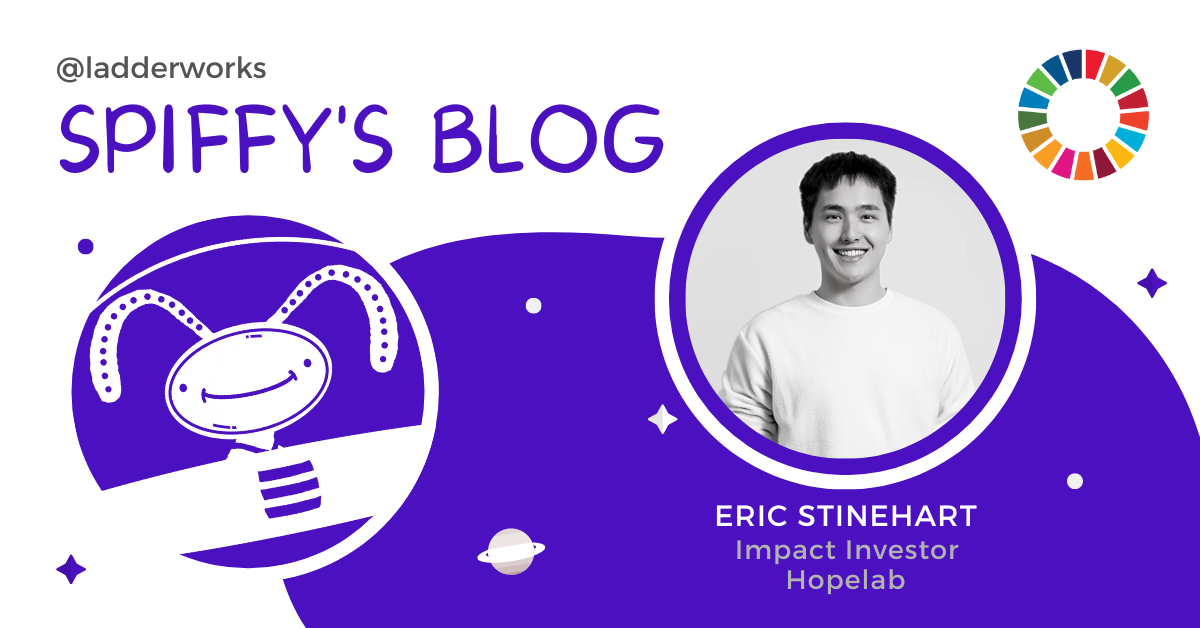Eric Stinehart: Improving Underserved Youth’s Mental Health through Innovation

Ladderworks is a publishing platform of diverse picture books and online curriculum with the mission to empower over a million kids to become social entrepreneurs. Our current series features interviews by our interplanetary journalist Spiffy with inspiring Social Entrepreneurs, Entrepreneurship Ecosystem Builders, and Changemakers who are advancing the UN SDGs.
Hey, friends! It's Spiffy, back again on Planet Earth with an eye on entrepreneurs making the world a more equitable place! I have another great interview for you this week. Today, I’m excited to cruise around with Eric Stinehart, an impact investor at Hopelab. Let’s see what he’s been up to!
Spiffy: Thanks for joining me, Eric! Tell me, what challenge are you addressing through your organization?
Eric: Glad to be with you, Spiffy! Hopelab strives to help create a world in which young people, in particular BIPOC and LGBTQ+ teens and young adults, are thriving, free from barriers to their mental health and well-being. As an impact investor at Hopelab Ventures, the majority of my time is spent thinking about how underserved youth’s mental health and well-being can be improved with scalable tech solutions, and taking action by finding who is best positioned to do so.
Spiffy: Very cool! What motivated you to tackle this challenge?
Eric: Graduating from college at the start of the pandemic marks me permanently as Gen Z. Like many other young people during this time in history, I have seen and felt firsthand the mental health crisis devastating our society. As an Asian-American and a member of the LGBTQ+ community who struggled with his own intersectional identities growing up, fighting for a more equitable world with less barriers to health and happiness isn’t simply professional, it’s personal. This is how and why I continue to be motivated to do this work.
Spiffy: Awesome! How would you say you or your team at Hopelab are working towards a more equitable world?
Eric: Hopelab’s equity goals are embedded in our mission: BIPOC, LGBTQ+, and low-income young people are the populations we serve. To date, a hundred percent of our Hopelab Ventures portfolio companies have founders who come from historically under-invested backgrounds, including BIPOC, LGBTQ+, and female-identifying persons. From increasing clinician cultural competency with Violet to advancing healthcare for individuals on Medicaid with Brave Health and beyond, we fund and support organizations who have equity in their DNA.
Spiffy: Tell me about a recent organizational milestone or initiative. What impact does that make on your community or audience?
Eric: While we now primarily focus on investing in and supporting mission-aligned companies and nonprofits, Hopelab has also had life-building, evidence-based, behavior change products focused on improving young people’s well-being. Our most recent product, imi, was launched just under a year ago and has been a huge milestone for us. imi (pronounced eye-me) is a free, digital resource which helps LGBTQ+ youth explore and affirm their identity and learn practical approaches to cope with stress that are helpful, inclusive, and joyful. This tool was developed by Hopelab in partnership with CenterLink, It Gets Better Project, and hundreds of LGBTQ+ young people across the US; and it has reached 42,000 youth within just six months of launch.
Spiffy: Congratulations on that success! Tell me about an inspiring startup that your organization has helped to advance its impact.
Eric: Founded by Mica Le John, Idoru is building Gen Z's new OS for self-expression, starting with the literal self: an avatar-creation app that enables users to build hyper-real digital selves and express themselves through AR-based content. While not a clinical intervention, Idoru is designed to improve mental health: research has shown that the digital self can have an incredible impact on the physical self. Moreover, Idoru is designed for and co-created with BIPOC and LGBTQ+ youth, allowing for extremely diverse self expression across skin colors, body types, and genders. Beyond investing in the company, Hopelab collaborated with Idoru to form an impact framework to measure psychological well-being and identity resilience of users.
Spiffy: Is there anything else you would love to tell our audience?
Eric: Mental health is such a personal journey, and I am constantly moved by the stories and lived experiences I hear on a daily basis in my job. On a personal level, this work has made me feel less alone—so many people out there are struggling, but at least we are in this fight together. I see the passion of people wanting to change the status quo, and progress is being made. I hope that anyone out there who comes across this can have this be a reminder to check in on their own mental health and the well-being of those around them. ❤️
Spiffy: Thanks for speaking with me today, Eric—it’s been an honor!
Eric Stinehart is an impact investor at Hopelab, where he invests in and supports startups improving youth mental health and well-being. Prior to Hopelab, Eric worked at a global expansion startup, the United Nations, and in strategy consulting. Eric holds an A.B. in Public Policy from Princeton University. (First published on the Ladderworks website on March 16, 2023.)
The views and opinions expressed herein are those of the interviewee and do not necessarily reflect those of Ladderworks LLC.
© 2023 Ladderworks LLC. Edited by George Romar. Spiffy’s illustration by Shreyas Navare. For the Ladderworks digital curriculum to help K-3 kids advance the UN SDGs, visit Spiffy's Launchpad: Creative Entrepreneurship Workshops for K-3 Kids and their caregivers here.


